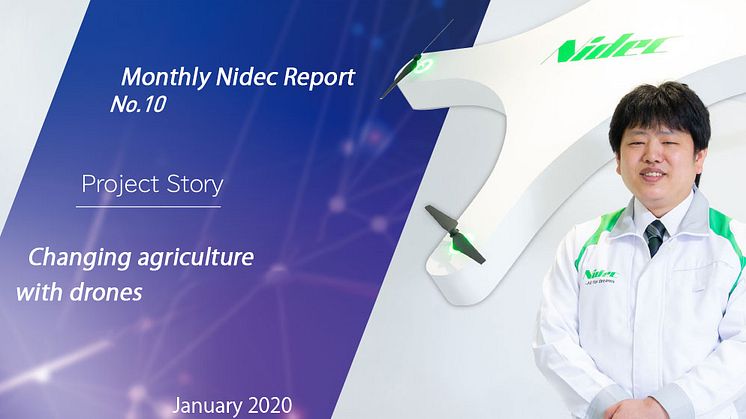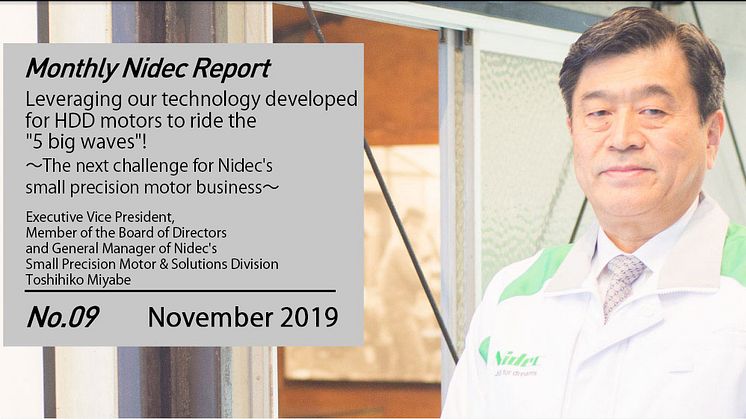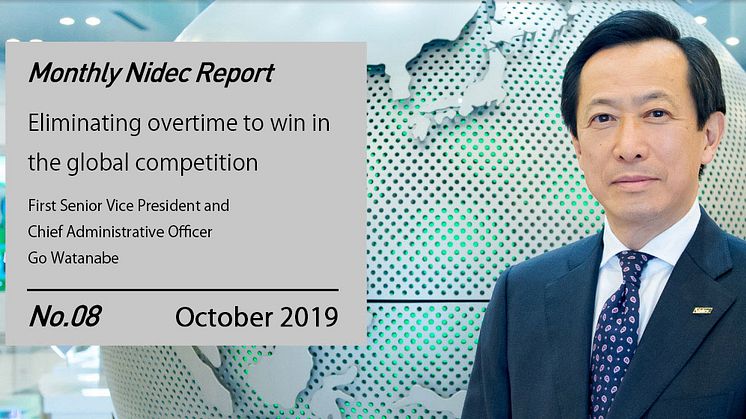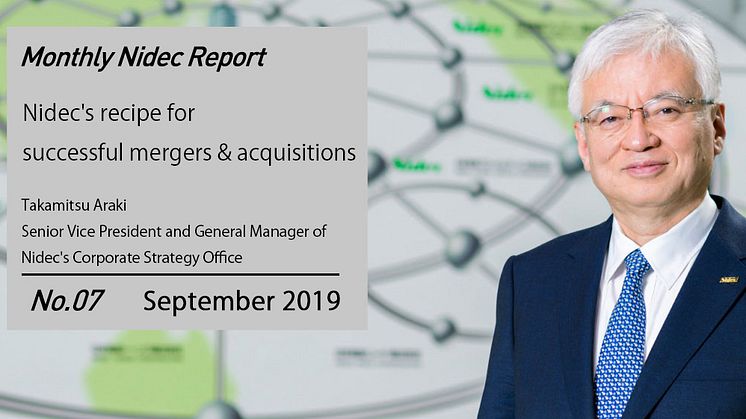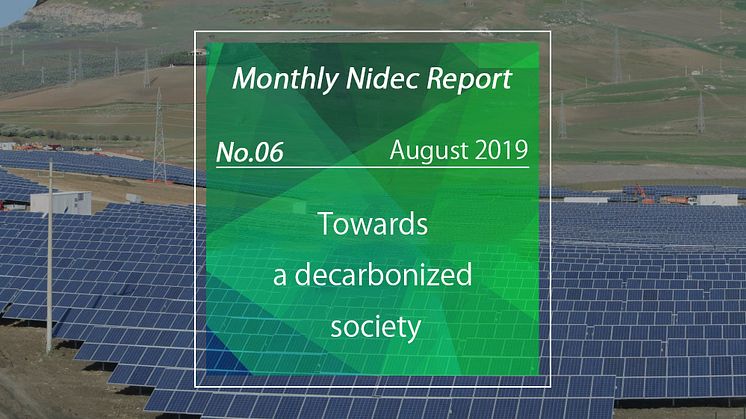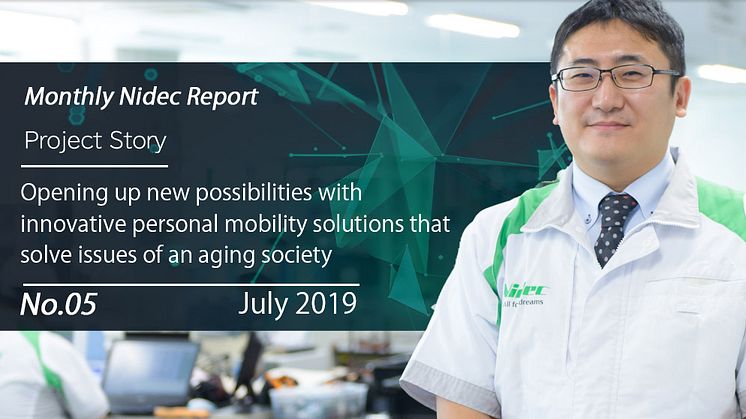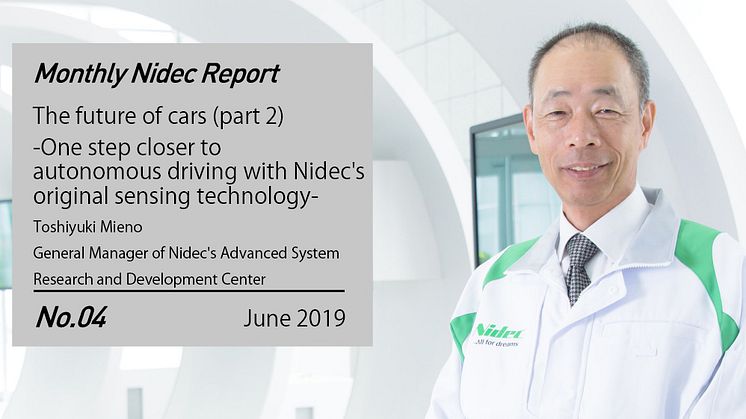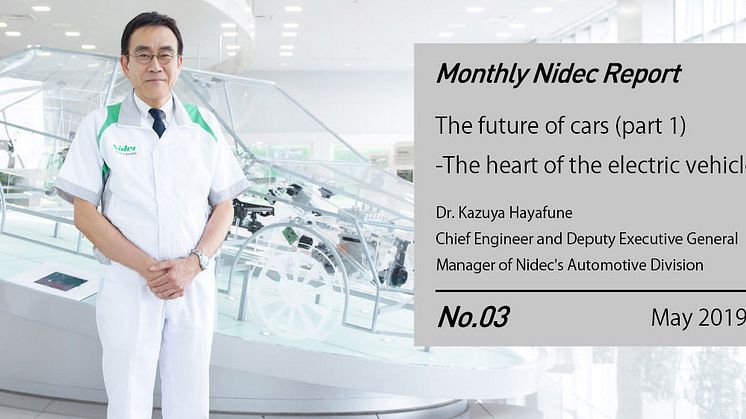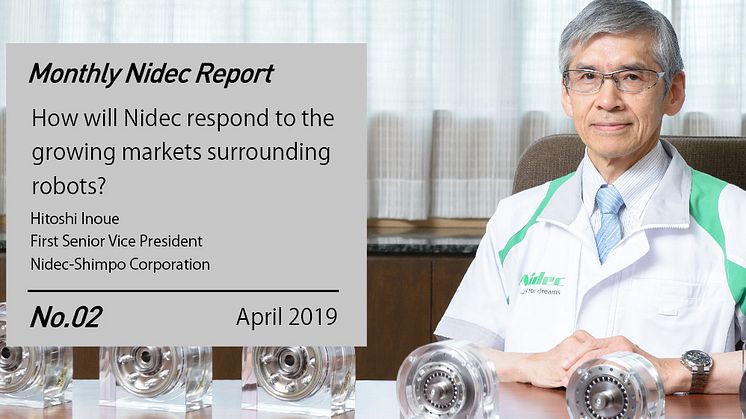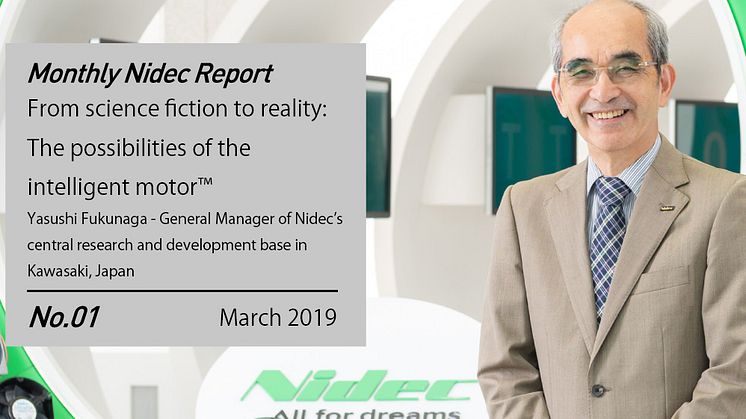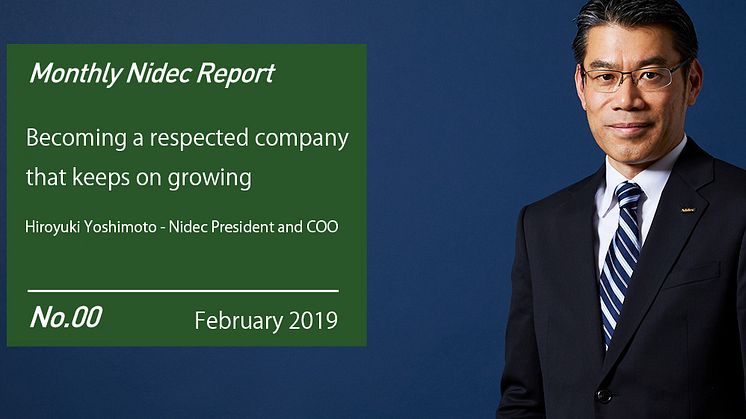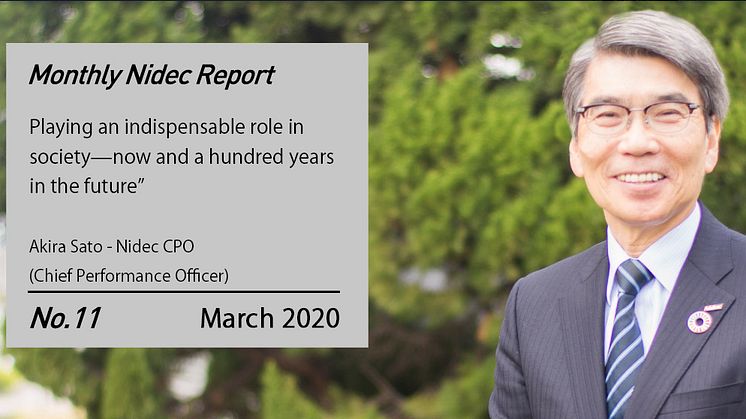
Blog post -
Monthly Nidec Report - Nidec's CSR
As the world unites behind the goal of "realizing a sustainable society," Corporate Social Responsibility (CSR) becomes more important than ever. Against this backdrop, the Nidec group is strengthening its efforts in the three areas of environmental, social, and governance, in addition to its core mission of striving to provide products and services that contribute to overcoming societal challenges, with the goal of being a company that plays an indispensable role in society—now and a hundred years in the future.
Sustainability—the keyword of CSR

- What is Nidec's basic approach to CSR?
Some time ago, CSR used to evoke images of some kind of "social contribution activities" that companies partake in beside their core business activities, but CSR, in its true meaning, is an important theme that relates to the essence of the operations of a company and permeates its management strategy.
When thinking about CSR, sustainability is a keyword that signifies an important concept. As symbolized by the SDGs, adopted in 2015 by the United Nations, "realizing a sustainable society" has become a common goal shared all over the world. Thinking on a global scale about what society we will leave behind for our descendants to live in 100 years from now has become a global megatrend involving not only governments but also private companies. The Nidec group's response, as codified in the "Aim of Nidec Corporation" is to "contribute to society by supplying world-class products" and aim to be "a company that plays an indispensable role in society even 100 years from now and beyond. "I believe this truly encapsulates what it means to run a company in line with the idea of "sustainability." We try to be a company that society can depend on by thinking about what society needs in order to develop sustainably and realizing our ideas sincerely one by one. This is the fundamental stance of the Nidec group's CSR activities.
*SDGs (Sustainable Development Goals). Global goals outlined in the "2030 Agenda for Sustainable Development" adopted at a UN general assembly in September, 2015. The SDGs are made up of 169 targets and 17 goals for realizing a sustainable society.

The rise of ESG investing
- Is there a relation between CSR activities and corporate growth and value?
Of course. CSR has become an important index used when taking investment decisions. In the west, socially responsible investment has been a widespread approach for quite a long time. This way of thinking considers the activities aimed at overcoming environmental and human rights issues instead of only focusing on the financial aspects of business. Put differently, companies unable to fulfill their social responsibilities are deemed unlikely to grow in the future, and thus not worthy to invest in.
This way of viewing things has developed into what we now call "sustainable investing" or "ESG investing." ESG, an acronym for Environment, Social and Governance, represents an approach to investment that considers these three nonfinancial dimensions in addition to financial information such as cash flow and profit margin.
In Europe it is already said to be the case that a majority of asset management is carried out in accordance with ESG investment. In Japan as well, the world's largest pension fund—the Government Pension Investment Fund (GPIF) as it is called—has started managing funds through ESG investment at an initial scale of JPY 1T, bringing corporate ESG activities into the spotlight in the country. Private companies like Nidec are aware of the necessity to focus not only on improving our financial results, but also endeavor to strengthen our ESG activities as well as actively disclose information in order to gain the understanding of the investment market.
Contributing to solving social problems through our business
- Specifically, in what way does the Nidec group contribute to the "realization of a sustainable society"?
Our contributions can roughly be divided into two categories: "the effects of our business" and "other activities."
Our business is diverse and consists of many different products and services. An easy-to-understand example of how they can contribute to society can be found in our environmentally friendly electric motors. On the one hand, electric motors are indispensable when it comes to making things "spin and move," and they play an important role in supporting the way that we live. However, on the other hand, they account for about 50% of global electricity consumption, so there is a great need for higher efficiency from the viewpoint of global environmental preservation. If, for example, we could improve the efficiency of all electric motors in the world by 10% we would be able to reduce electricity consumption by the equivalent of the electricity produced by 100 nuclear reactors. By leveraging our capabilities as the world's No. 1 comprehensive motor manufacturer, Nidec will continue developing energy-efficient motors, represented by the brushless DC motor, and promote their use across the world. In this way, we contribute to solving global warming and global energy problems.
Currently, the Nidec group focuses on achieving further growth by catching five "waves" of technological innovation closely related to our business: "the electrification of automobiles," "the increased utilization of robots," "the move towards brushless DC motors in the home appliance industry," "manpower-saving in logistics," and "the digital explosion brought about by 5G. "If you think about it, all of these global trends are societal needs that Nidec is trying to meet. In other words, our business strategy has a strong connection with solving important social issues.

For example, our response to "the electrification of automobiles"—one of the five big waves—was to develop a traction motor for electric vehicles. We started supplying the motor to customers in China in April last year. If this product sees widespread use around the world, it is likely to contribute to solving environmental issues in various countries. Another example is our automotive cameras and radars for ADAS (Advanced Driver-Assistance Systems) applications. These products contribute to the realization of a society free from car accidents.
When it comes to the trends of "increased use of robots" and "Manpower-saving in agriculture & logistics," we have a variety of products and technologies—brushless DC motors for personal mobility devices, super-flat actuators for exoskeletons etc.—that meet the needs of society. We also contribute to the adoption of renewable energy sources and provide power solutions for use in remote locations and more. There are too many solutions to list here. What these business areas have in common is that all of them are expected to grow precisely because they create new value that contributes to the realization of a sustainable society.
Our other CSR activities that aren't directly related to our business, on the other hand, are mainly focused on the following five areas: environment, education, disaster relief, social welfare / regional contribution, and sport. Taking sport as an example, we contribute to the growth of competitive skating by supporting the activities of Nidec Sankyo's speed skating team. This team has reared many world-class athletes that have brought excitement to many people. Our education-related activities involve environmental awareness classes that aim to impart the importance of preserving the global environment to children while also teaching them about manufacturing by letting them build their own small motors. We organize these classes both in Japan and overseas. In 2017 we made a donation to Kyoto University's graduate school of engineering for the establishment of a new course about the realization of a sustainable global environment through engineering specialized in leading-edge electrical devices.
 Environmental awareness classes
Environmental awareness classes
 Nidec Sankyo's speed skating team
Nidec Sankyo's speed skating team
"8 key challenges" focused on ESG
- Can you give an explanation of the "CSR vision 2020" project that you are promoting?
"CSR vision 2020," formulated during FY2016, is the Nidec group's basic plan for CSR activities. It was drawn up in accordance with the company group's medium-term strategic goals detailed in our "vision 2002" initiative. The plan details 8 key challenges in the three areas of Environment (E), Social (S) and Governance (G). By painting a picture of the ideal situation that we want to achieve in FY2020 and providing a clear KPI (Key Performance Indicator), the plan serves as our compass. For example, we are working to lessen the impact that our business activities has on the Environment (E) by reducing carbon dioxide emissions, industrial waste water and hazardous waste. In April last year we started a project called "SMART 2030" (see the column at the end of the article) characterized by its ambitious—both in qualitative and quantitative terms—goal.
The key challenges in the Social (S) area of our CSR vision are focused on increased diversity and development of global talent. For example, we aim to achieve a better balance of men and women in managerial positions and have introduced a variety of different measures, such as telecommuting and staggered office hours, with the goal of boosting productivity while also supporting diverse ways of working. Additionally, we have introduced career-friendly programs such as a system that provides a way for employees to utilize temporary leave instead of resigning when moving as a result of their spouse being transferred within their company. On the talent development front, we have opened a global learning center, in front of our Kyoto head office, where candidates for senior management positions from around the world gather to partake in extensive group training programs that include CSR-focused sessions. As for Governance (G), we are strengthening internal governance and corporate ethics as well as risk management.

Actually, one of the motivators for strengthening our ESG activities was customer demand. Many of our customers are at the forefront of ESG and companies that are part of their supply chains, such as the Nidec group, are expected to maintain a high level as well. Thus, we leveraged the experience that we had gained by working with these companies and built our own ESG management system based on the Electronic Industry coalition Code of Conduct (EICC, now RBA). Starting three years ago, we now inspect our business sites all around the world on our own initiative.

Nidec’s CSR Vision 2020
Establishing a framework for CSR promotion on a global scale
- What is Nidec's strategy for deploying its CSR program and ensuring that it is followed in all of the over 40 countries where the company group is active?
In 2008 we established a CSR charter that stipulates Nidec's basic stance for its relations with society, together with our three basic management creeds. In 2018 we formulated our CSR declaration of conduct, a concrete plan with the aim of expanding the application of our CSR charter to all of our global operations. This comprehensive plan covers the business directions and decisions that our employees all around the world should take.
Our strategy for expanding our CSR program on a global scale revolves around strengthening our management system based on five regional headquarters in Japan, America, Europe (EMEA), China and the other parts of Asia. The Nidec group currently has over 320 factories and offices in over 40 countries around the world. These business sites can be likened to 320 vertical threads. On the other hand, we have common functions—tax and legal matters, production engineering and purchasing etc.—shared by all of these companies. These can be likened to horizontal threads. By interweaving them with the vertical threads we can create a strong organization based on overall optimization. Our CSR initiative is one of the vertical threads in this weave. We manage the CSR activities of each of our companies with a global perspective centered on "a sustainable tomorrow" and based on the cultures and customs of each country and each region.

- Finally, moving forward, what ambitions do you have for the Nidec group's CSR activities?
In June 2018, Nidec was included for the first time in the "FTSE4Good Index Series" and the "FTSE Blossom Japan Index," both of which are representative stock price indexes for ESG (Environmental, Social, and Governance) investment. I view this as a sign that our efforts have been recognized by the market. In the future, we will keep up our efforts to contribute to society.
When people make stock investments their decisions are usually based on financial information such as operating profit and return on equity. I believe that ESG functions as the framework—the supporting structure or, in other words, the "physical fitness" of the company—that constitutes the platform for the financial results. That is to say, companies that fail to pay attention to ESG cannot survive in the long term. This is how vital ESG has become, and this is the very reason why we established an action plan with concrete objectives and started focusing on ESG. Nidec's aim is not only to grow our business in a variety of markets, but also to be a healthy, sound company that survives in the long term.

Countries all around the world are strengthening their efforts to reduce greenhouse gas emissions as the problem of climate change grows increasingly severe. With this in mind, the Nidec group has launched a new initiative that we call "SMART (Sustainable Manufacturing And Resilient Tomorrow 2030." The aim of this project is to "cut greenhouse gas emissions by 30% in FY2030 compared to FY2017 figures." Endeavoring to reduce greenhouse gas emissions is nothing new to us, but up until now our targets have been based on energy consumption rate. In contrast, with our new target outlined in SMART 2030 we aim to reduce the total amount of emissions by 30%. Taking our future growth trajectory into account, you could say that it is a very ambitious target. Moving forward, all of the companies in the Nidec group will make concerted and united efforts to achieve this challenging target by reducing energy consumption and move towards introducing renewable energy sources in all of our offices and factories around the world. |
